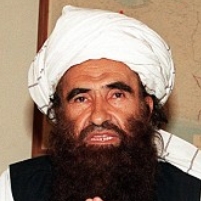Who Are the Enemies U.S. is Bombing in Pakistan?
Thursday, July 23, 2009
 Jalaluddin Haqqani
Jalaluddin Haqqani
Three of the most important “high value” targets of the U.S. military in Pakistan are top Taliban leaders, including a former Western ally who today is behind the attacks on American and NATO forces in Afghanistan.
Jalaluddin Haqqani was once part of the CIA-backed mujahideen that fought against the Soviet occupation of Afghanistan in the 1980s, when he became close to Osama bin Laden and worked with Saudi, American and Pakistani intelligence agencies. The U.S. had no problem arming Haqqani then, providing Stinger missiles, tanks and other weapons to attack the Soviets. Today, the U.S. would like nothing more than for Pakistani agents to capture or kill him, but that may be tough to expect given Haqqani’s long relationship with Pakistan’s intelligence operation. This might explain why the U.S. has launched 13 air strikes using unmanned Predator aircraft on Haqqani’s network.
Taliban fighters commanded by Baitullah Mehsud and Mullah Nazir have been struck 19 times each by Predators. Mehsud is the leader of the Taliban sub-group, Tehrik-i-Taliban Pakistan, based in Waziristan, where almost 90% of all U.S. air strikes have taken place. The Pakistan government has accused Mehsud of being behind the assassination of former Prime Minister Benazir Bhutto in December 2007.
Nazir, based in South Waziristan, is a former rival of Mehsud who now supports him. An American attack in 2008 purportedly came close to getting Nazir, who was wounded but survived.
The U.S. has launched 31 Predator attacks in Pakistan in 2009, which puts it on pace to far exceed last year’s total of 36.
-Noel Brinkerhoff
US Predator Strikes in Pakistan: Observations (by Bill Roggio and Alexander Mayer, Long War Journal)
U.S. Predator Strikes in Pakistan (chart #5) (Long War Journal)
Baitullah Mehsud (Wikipedia)
US Strikes Target Mullah Nazir in South Waziristan (by Bill Roggio, Long War Journal)
Jalaluddin Haqqani (Frontline)
- Top Stories
- Unusual News
- Where is the Money Going?
- Controversies
- U.S. and the World
- Appointments and Resignations
- Latest News
- Musk and Trump Fire Members of Congress
- Trump Calls for Violent Street Demonstrations Against Himself
- Trump Changes Name of Republican Party
- The 2024 Election By the Numbers
- Bashar al-Assad—The Fall of a Rabid AntiSemite






Comments